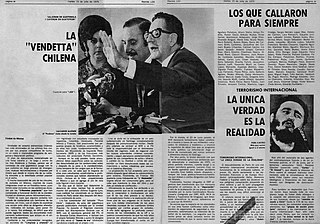This article needs additional citations for verification .(February 2024) |
| |||||
| Decades: | |||||
|---|---|---|---|---|---|
| See also: | |||||
The following lists events that happened during 1894 in Chile .
This article needs additional citations for verification .(February 2024) |
| |||||
| Decades: | |||||
|---|---|---|---|---|---|
| See also: | |||||
The following lists events that happened during 1894 in Chile .

Chile officially the Republic of Chile, is a country in western South America. It is the southernmost country in the world and the closest to Antarctica, stretching along a narrow strip of land between the Andes Mountains and the Pacific Ocean. Chile had a population of 17.5 million as of the latest census in 2017 and has a territorial area of 756,102 square kilometers (291,933 sq mi), sharing borders with Peru to the north, Bolivia to the northeast, Argentina to the east, and the Drake Passage to the south. The country also controls several Pacific islands, including Juan Fernández, Isla Salas y Gómez, Desventuradas, and Easter Island, and claims about 1,250,000 square kilometers (480,000 sq mi) of Antarctica as the Chilean Antarctic Territory. The capital and largest city of Chile is Santiago, and the national language is Spanish.

The 1973 Chilean coup d'état was a military overthrow of the democratic socialist president of Chile Salvador Allende and his Popular Unity coalition government. Allende, who has been described as the first Marxist to be democratically elected president in a Latin American liberal democracy, faced significant social unrest, political tension with the opposition-controlled National Congress of Chile. On 11 September 1973, a group of military officers, led by General Augusto Pinochet, seized power in a coup, ending civilian rule.

The Chile national football team, nicknamed La Roja, represents Chile in men's international football competitions and is controlled by the Federación de Fútbol de Chile which was established in 1895. Chile has appeared in nine World Cup tournaments and were hosts of the 1962 FIFA World Cup where they finished in third place, the highest position the country has ever achieved in the World Cup.

Manuel José Blanco y Calvo de Encalada was a vice-admiral in the Chilean Navy, a political figure, and Chile's first President (Provisional) (1826).

Operation Colombo was an operation undertaken by the DINA in 1975 to make political dissidents disappear. At least 119 people are alleged to have been abducted and later killed. The magazines published a list of 119 dead political opponents.
The Battle of Curalaba was a battle and an ambush in 1598 when Mapuche people led by Pelantaru defeated Spanish conquerors led by Martín García Óñez de Loyola at Curalaba, southern Chile. In Chilean historiography, where the event is often called the Disaster of Curalaba, the battle marks the end of the conquest period in Chile's history, although the fast Spanish expansion in the south had already been halted in the 1550s. The battle led to a general Mapuche uprising that resulted in Destruction of the Seven Cities. This severe crisis reshaped Colonial Chile and forced the Spanish to reassess their mode of warfare.
The Chile men's national tennis team represents Chile in Davis Cup tennis tournament and is governed by Federación de tenis de Chile. The team played in the World Group on 2019 and reached the final one time in 1976, losing the cup against Italy in Santiago. Chile is currently #17 in the ITF Davis Cup rankings. The team is currently captained by former Chilean tennis player Nicolás Massú.

Fernando José Riera Bauzá was a Chilean professional football player and manager, patriarch of Chilean football.
Hernán Carrasco Vivanco was a Chilean football manager.

Adelqui Migliar, also known as Adelqui Millar, was a Chilean film actor, director, writer and producer. He appeared in 31 silent films between 1916 and 1928. He also directed 24 films between 1922 and 1954. He was born in Concepción, Chile, and lived and worked in the Netherlands, the United Kingdom and the United States. He died in Santiago, Chile.

Alberto Jorge Fouillioux Ahumada was a Chilean football midfielder and striker who earned 70 caps and scored 12 goals for the Chile national team during his career.
It is estimated that there are over 20,000 Chinese people in Chile. Chinese immigrants come from both China and Taiwan.

The Chile national beach soccer team represents Chile in international beach soccer competitions and is controlled by the FFC, the governing body for football in Chile.

Augusto José Ramón Pinochet Ugarte was a Chilean military officer who was the dictator of Chile from 1973 to 1990. From 1973 to 1981, he was the leader of the military junta, which in 1974 declared him President of the Republic and thus the dictator of Chile; in 1980, a referendum approved a new constitution confirming him in the office, after which he served as de jure president from 1981 to 1990. His time in office remains the longest of any Chilean ruler.

Ubaldo Cruche was a Uruguayan footballer who played for clubs in both Uruguay and Chile as well as for the Uruguay national football team in the Copa América 1941. He was born in Montevideo in May 1920 and died in 1988.

Andrés Rafael Prieto Urrejola was a Chilean football forward who played for Chile in the 1950 FIFA World Cup. He also played for Club Deportivo Universidad Católica.

The Chilean Handball Federation (CHF) is the governing body of handball and beach handball in the Republic of Chile. Founded in 1980, CHF is affiliated to the International Handball Federation and the Pan-American Team Handball Federation. CHF is also affiliated to the Chilean Olympic Committee. It is based in Santiago.
The following lists events that happened during 1893 in Chile.
The following lists events that happened during 1895 in Chile.

Donaldo Ross was a Uruguayan football player and manager.